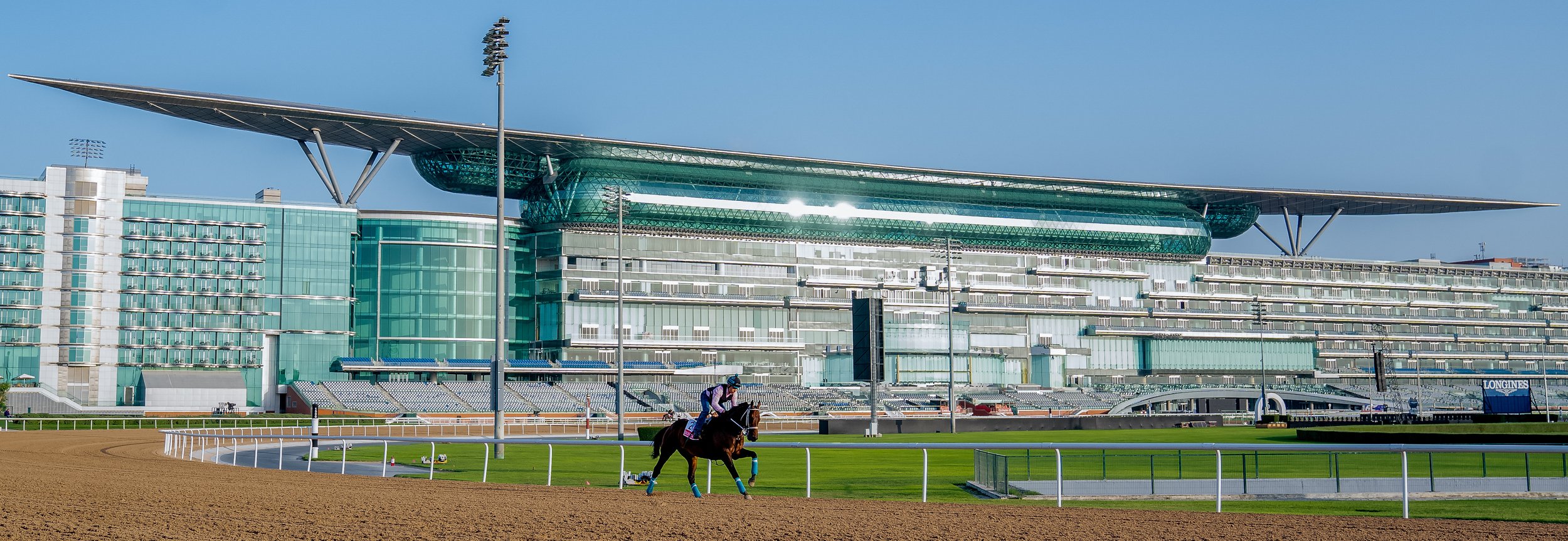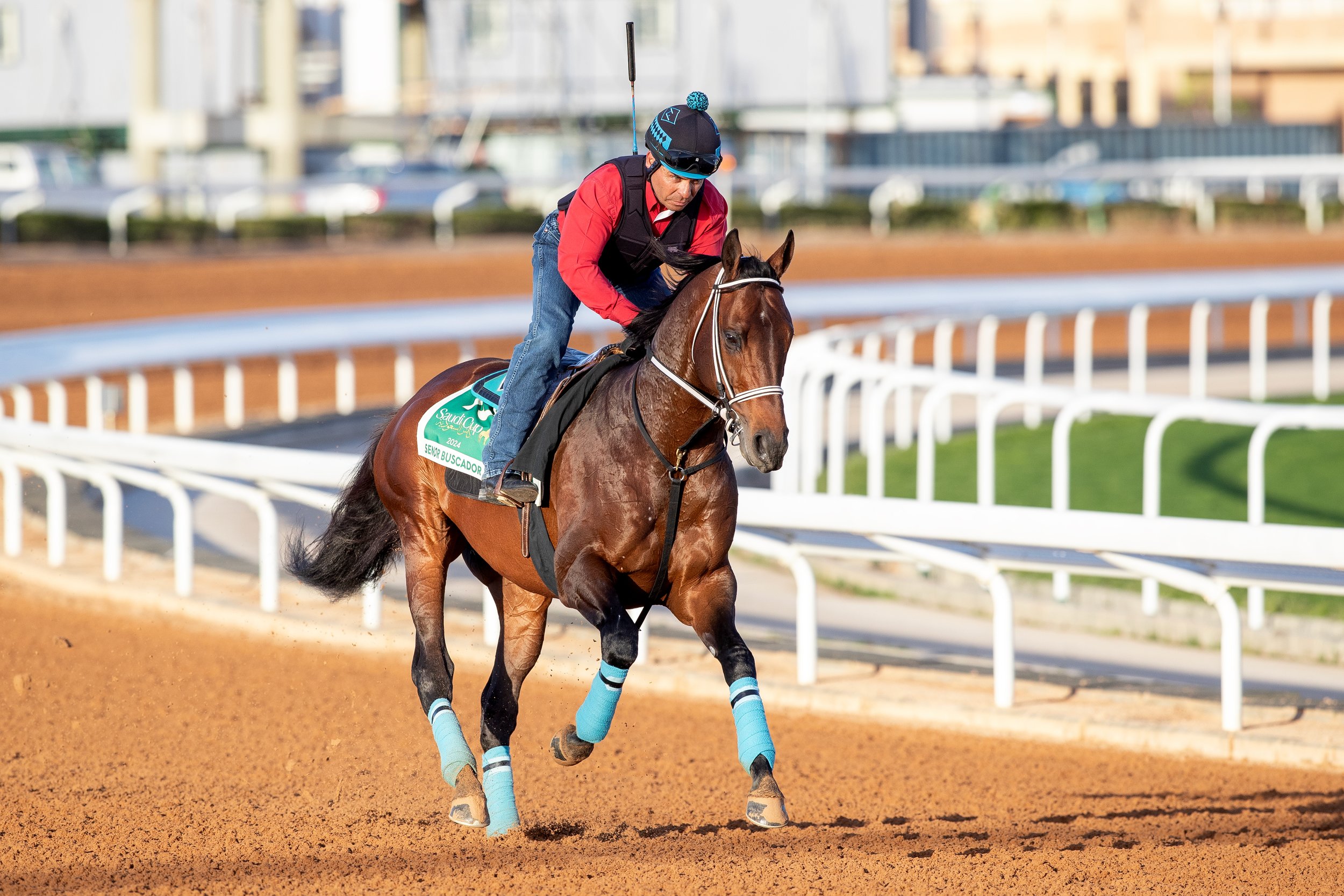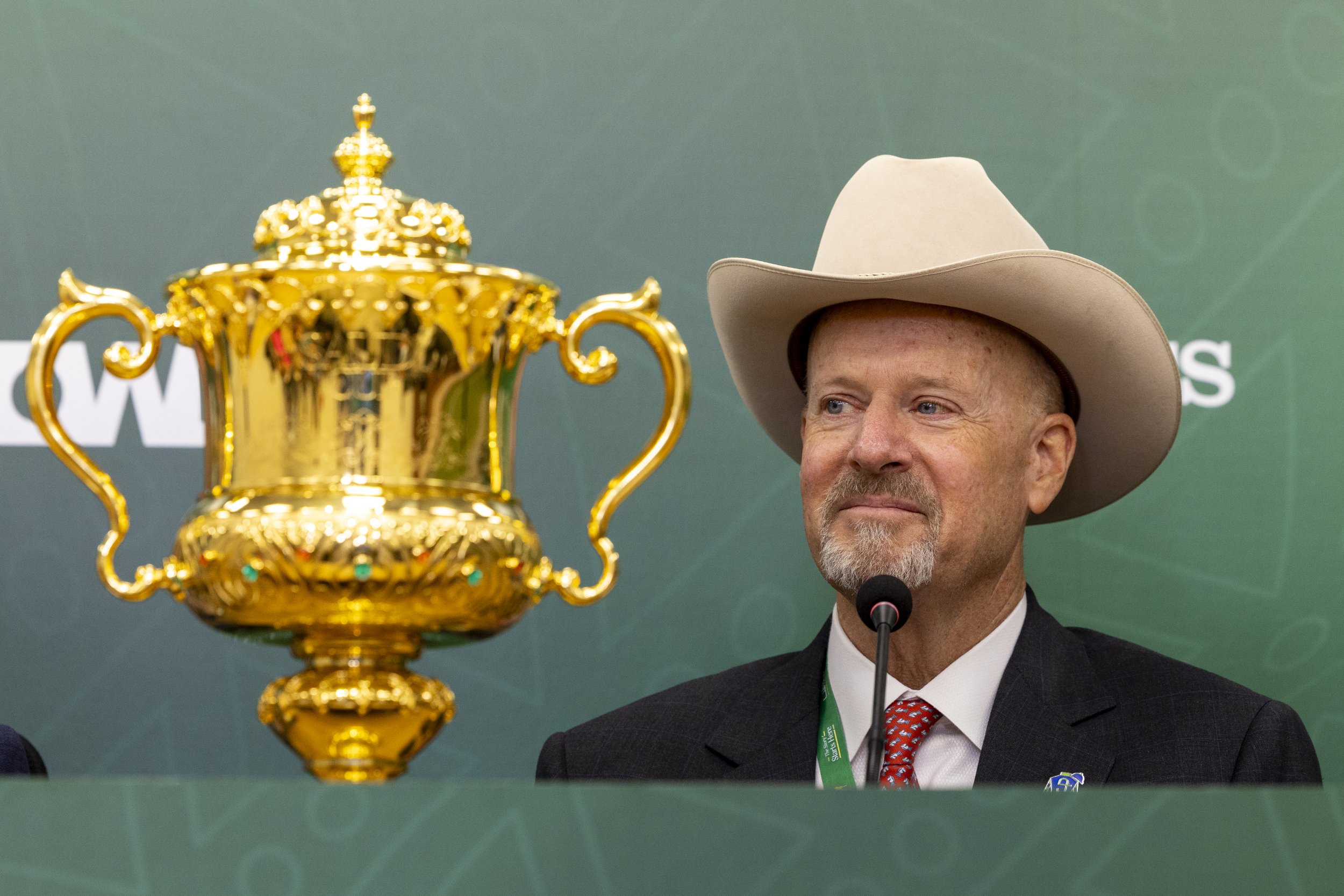#Soundbites - Do three-year-old fillies deserve better treatment in the Triple Crown series?
Compiled by Bill Heller
Since 2013, when the Kentucky Derby began using a point system to determine who starts in the Run for the Roses, no filly has raced in the Derby. This year, only seven of the 373 three-year-olds nominated for the Triple Crown were fillies. Do three-year-old fillies deserve better treatment, either by making Kentucky Derby and Kentucky Oaks points interchangeable and/or by making a more meaningful and permanent filly Triple Crown?
Bret Calhoun
I think the only way they can get points is one of the prep races against the males. Honestly, I think it’s a fair enough system. In my mind, if they’re going to take them on in the Derby, they probably should have to be proven against some of them in their prep races.
Kevin Attard
I do think they should have the option to run in the Oaks or take on the boys. Obviously, it takes a very special filly to win that race. Having a Triple Crown for the fillies I think is a wonderful idea. A series for the fillies would be something of significance. In today’s age of social media, you can reach out to a broader audience. In Canada, they do have the Triple Tiara. It’s not the equivalent to the colts. It doesn’t get the attention of the real Triple Crown.
Ron Moquett
I would say make a more permanent and meaningful Filly Triple Crown. Or there could be a deal where you could give up your status as a filly and only run in the Derby preps to get your own points and make yourselves eligible for the Kentucky Derby. That’s fine. That’s good because you did it against the competition that you are required to meet. You can’t get Derby points by beating fillies to run against colts. But I think we should constantly be looking at things to evolve the sport and keep moving forward. In the end, you’ve got to remember the whole thing we’re trying to do is to breed a better horse. So every decision we make sincerely should be about showcasing the best of our breed.
Neil Drysdale
Interchangeable points don’t work because you can’t run colts against fillies, but I think fillies should be running in the Triple Crown, especially looking back in history. The point is if you’ve got a filly and you want to run a mile and a quarter (the Derby distance) instead of a mile and an eighth (the Oaks distance), you should be allowed to do that. My own opinion is that the point system seems to be quite arbitrary. The point system needs to be continually revised until they get it right.
Todd Fincher
Well, as long as they’re not transgender it’s okay (long laugh). I don’t think it’s against the fillies. If they want to run in the Derby, they just have to face the boys in the preps. The filly races are pretty lucrative. There’s so much money not only in the purses, but in winning a Grade 1 with a filly. So unless you think you’re a real monster, you just stay in your lane. If you think your filly is good enough, well, run with the boys.
Peter Eurton
Wow, that is a good question, because I’ve never really even thought about it. For me, I would think that they should have an opportunity, but then it’s going to keep out some of the colts. That would be the biggest issue.
Richard Mandella
The Oaks is a big purse, and it’s at a very high level. You kind of hate to have too many fillies in the Derby. Maybe there could be a committee, people from Kentucky, California, New York and two other places, that allows starters to get in the Derby as a special case.
Todd Fincher - From Sunland Park to Saudi Arabia
Article by Ken Snyder
Ask Todd Fincher how he got Senor Buscador from Remington Park to Riyadh and the $10 million dollar Saudi Cup winner’s purse, and you won’t get an answer; you’ll get a bunch of answers.
“There’s honesty. There’s hard work. Being able to evaluate horses and place them in the right spot. The feeding program. Your help. Not cutting corners. All that stuff.”
Got it, Todd. Now, what’s the formula for blending all of that? If it could be quantified and applied, we’d all be Thoroughbred trainers. Todd Fincher can’t tell you exactly how he arrived in the winner’s circle after the Saudi Cup. But there may be a reason why.
“You celebrate in the winner’s circle and then you walk out of there. You have your mind on other things, other responsibilities.”
At the post-race press conference, it was obvious he really had left any whooping, hollering, and hugging back in the winner’s circle. Maybe he smiled once as jockey Junior Alvarado and owner Jerry Peacock fielded questions. There’s pre-occupation and then there’s Todd Fincher pre-occupation. His mind was already on “other things,” specifically Sunland Park in New Mexico and his string of 90 horses.
He “came back immediately” from Saudi Arabia, which might have meant a red-eye flight that night. He came to Saudi Arabia as he departed, with no days or hours wasted with idle time.
“I didn’t go over until a couple of days before the race,” said Fincher. Instead, he sent assistant Oscar Rojero with Senor Buscador on the 13th of February for a race run on the 24th. Want to know about Saudi Arabia? Rojero, not Fincher, is your man.
An assessment of Fincher as a classic “big fish in a small pond” is subject to re-examination only partially because of the Saudi Cup win. Last year he shipped Senor Buscador to Del Mar to win the Grade 2 San Diego Handicap and finished second with two other horses--Flying Connection and Bye Bye Bobby in graded stakes at Del Mar. All total, his horses hit the board in graded stakes in four out of six races in San Diego. It’s not hard to imagine Fincher duplicating the success he has achieved in New Mexico in racing’s big ponds—Keeneland, Santa Anita, Saratoga, Belmont. Add to that an eye-popping 24% career win rate.
Looking back at Del Mar he understates his success considerably. “That’s starting to compete at the top level. Not Bob Baffert yet, but, you know, with the few numbers we have of those type of horses, I think we’ve done pretty well.”
Take note of that word “yet.” Fincher has thoughts of setting up a division at Del Mar in the future and is venturing into Oaklawn this year with “a few. But not a full string,” he added. Yet...
“Big farms aren’t going to look my way because I’m in New Mexico and I understand that, but I will eventually, maybe this year, start running two separate barns,” He added that he will "keep New Mexico going.”
Fincher is a defender of New Mexico racing and pointed out the state has produced both a Kentucky Derby winner in 2009 (Mine that Bird) and a Kentucky Oaks winner in 2011 (Plum Pretty).
“We got a lot of people in New Mexico who are great horsemen. You can develop a horse through our stakes schedule with good purses.”
If it’s a long way to Saudi Arabia from New Mexico, getting to Kentucky may be more manageable with more promising two-year-olds than ever in his barn.
“Last year when I broke babies, I had two Kentucky-breds. Two fillies and one colt.
“This year I had some people step up and fill my barn a little more. We broke fifteen yearlings this year that are Kentucky-breds or Louisiana-breds.
“It’s just very rare for me to get that many,” he added.
Roots in New Mexico run deep for the 52-year-old Fincher. His grandfather, Albert, was a trainer stabling at the old La Mesa Park in Raton, New Mexico as well as at Sunland. Albert’s son, Leroy—Todd’s father—also trained Quarterhorses and Thoroughbreds after a jockey career. As if that isn’t enough pedigree, Todd’s mom Leslie trained Quarterhorses and Thoroughbreds.
It is said that half of life is just showing up. Fincher has had only the other half to figure out. The major lesson he got from family was “Show up every day to work. That’s basically what I derived from my family.
“I worked in the barn. We had jobs at the barn. I would do the water buckets and he would do the hay bags. We were in charge of holding horses for the baths and raking the shedrow. I’m talking from an early age—probably nine, ten years old.”
New Mexico racetracks were also a playground for the Fincher boys. “Your parents would be working, and you’d be running around the grandstands walking back to the barn screwing around and just running loose basically.”
“Play” also included putting down a bet or two at the betting windows with mutuel clerks who knew the Fincher boys. “I could barely reach up to the window. I‘d put my two dollars up there and bet at an early age. That was illegal, but back then everything was a little quieter. “
Fincher’s dream was to follow in the family bootsteps and become a jockey. The lanky, six-feet tall averaged a respectable 14% win rate before waving the white flag to weight after ten years of riding in 1997 and immediately hung up his own shingle the next year. Fincher never worked as an assistant but started with eight horses, the most expensive of which was $5,000.
Transitioning from jockeying to training might have been the equivalent of a family doctor performing brain surgery. “The one thing that really shocked me about training is how much I didn’t know.
“You’ve heard jockeys don’t make good trainers. That’s basically because they’re two completely different jobs.
“There’s a lot of jockeys that don’t know horses. They just learned how to ride a horse and that’s all,” he added.
He believes his time on the ground grooming as an adolescent and teenager for his dad taught him the importance of understanding a horse. When it came time to sit astride one and break from the gate, that experience was invaluable…to a point.
“I could get on a horse and tell you everything about it…evaluate the horse.
“As a trainer watching, it was a brand new thing. It took a long time to be able to watch a horse and differentiate certain things about a horse—how good they looked when they were running, if they’re just average. Watching the horse move was the biggest challenge, I think.
“You learn from there, then the next year you get some more horses, and every year from then on. It’s grown, and we’re pointing for the quality and not the quantity. We kind of have both now.”
Fincher says 90% of his horses come to him as yearlings. “If I have somebody bugging me to claim horses, we will, but I really have no interest.
“You claim a horse, odds are you pay twenty-thousand dollars, and you got a twenty-thousand dollar horse.
“We’re looking for the home runs to develop a horse into a classic-type horse or stakes winner—the top level.”
Mission accomplished. They don’t get any more top level than Senor Buscador and the Saudi Cup and Fincher knew it.
He was confident the horse could beat the best in the world if he got an honest pace.
“As far back as he gets, he can get himself in a lot of trouble,” said Fincher. True to form, Buscador was far behind the field by as many as six lengths, loping along next to Japanese starter Ushba Tesoro. Entering the stretch, Senor Buscador fell in behind the Japanese entry then popped out from behind him to the outside. Again, true to form, he spotted Ushba Tesoro as much as three lengths in the stretch before cruising by ten horses, including his Japanese runner by a nose at the wire.
“I think he just lets them get after it first and enjoys running by horses. That’s exactly what it is. He’s got enough speed. He can go to the front if he wanted but he refuses.”
For Fincher, with his total focus, it’s not hard to believe that “validation and vindication” for Senor Buscador meant more than the purse. “Everybody talks about the purse, which is outstanding. For him to beat the best horses in the world was much, much greater for me than the value of the race.
“I’ve been making excuses for this guy for a long time knowing how good he is.”
Adapting to the horse rather than the other way around might have been still another additional factor in the win. “If I really tried, I guess I could probably change his running style, but I think it would be detrimental to him.
“The ability is there, and I think he’s the best horse. I don’t question that.”
Fincher’s abilities as a trainer sort of mirror Senor Buscador’s performance in the Saudi Cup. All the horse needed was a clean trip. All that Fincher needs is the opportunities. Racing has probably not seen the last of him at center stage like the winner’s circle at King Abdulaziz Racecourse, but you’ll have to hurry to catch him before he’s gone.
Other things. Other responsibilities.
Todd Fincher would amend lyrics to an old song from the 1950’s movie Cinderella "A Dream Is a Wish Your Heart Makes" to “A Dream is a Wish your Hands and Feet Make.”
The dots don’t connect between Sunland Park and Ruidoso Downs in New Mexico and King Abdulaziz Racecourse in Saudi Arabia and Meydan Racecourse in Dubai…unless you’re Todd Fincher.
A win in the $20 million Saudi Cup with Senor Buscador and a third place showing in the Dubai World Cup (earning a mere $1.2 million) are dreams most trainers wouldn’t ever entertain.
For those who know him any length of time, it is no surprise to hear him say on reaching the highest of heights in racing, “I’ve always been planning on it and hoped to get there. Those are goals that I set. I hope we can reach some more goals pretty soon.”
Gulp.
At first you might not take him seriously until you consider that, well, he did it once, and yes, he did it based in Sunland Park, New Mexico.
Asked what he did after Saudi Arabia and Dubai, the laconic cowboy simply said, “Came home and went back to work. That’s what we do. Go to work every day.”
And make dreams come true.
#Soundbites - Which other trainer do you most admire on the backstretch, and why?
Article by Bill Heller
Bret Calhoun
Brendan Walsh
Wayne Lukas never ceases to amaze me. He’s out there every morning. He’s at the sales and still competing at the highest level. He’s a guy that amazes me.
Brendan Walsh
There are a lot of trainers on the backstretch that I admire for different things. Some are good with stakes horses. Some of them are good with young horses. There’s almost too many to mention. I don’t really want to name one.
Todd Fincher
The ones I admire the most are the ones who started in the grass roots and worked their way up and became successful. Most of those guys have a true love of horse racing. It’s not an easy profession. It’s an unending job. Those guys that fought through adversity are the ones that I admire most.
Peter Miller
There are a lot of them I admire. Here in Southern California, I admire Richard Mandella and John Sheriffs because they limit the number of horses they take. I can’t do that. I’m a horse junkie. I admire Brad Cox and Steve Asmussen because they run such a huge operation with success at all levels. That shows a lot of organizational skills as well as horsemen skills. They also know how to delegate. I don’t even know how they do it. You can also throw in Todd Pletcher and Chad Brown. I’m at 80 horses, and I’m at my wit’s end!
Gary Contessa
That is a no-brainer: Wayne Lukas. He revolutionized the entire racing industry, and people took his lead. He came to the East Coast, and he showed us how to talk to clients; showed us how to develop young horses; and showed us what a barn should be like. Look at the history. What trainer in America has developed more good trainers than he has? Nobody. He’s developed horses and people.
Ron Moquett
There’s a lot of people you admire for different reasons. Probably the older guys like Bernie Flint, Jinks Fires and Wayne Lukas. They’re forever evolving. To be involved in this business for so many years and compete at a high level, it’s impressive. They do it year after year.
Larry Rivelli
Larry Rivelli
Wesley Ward—because he’s one of the very few jockeys that have become successful trainers. A lot of them tried and failed. He didn’t. He’s at an elite level.
















